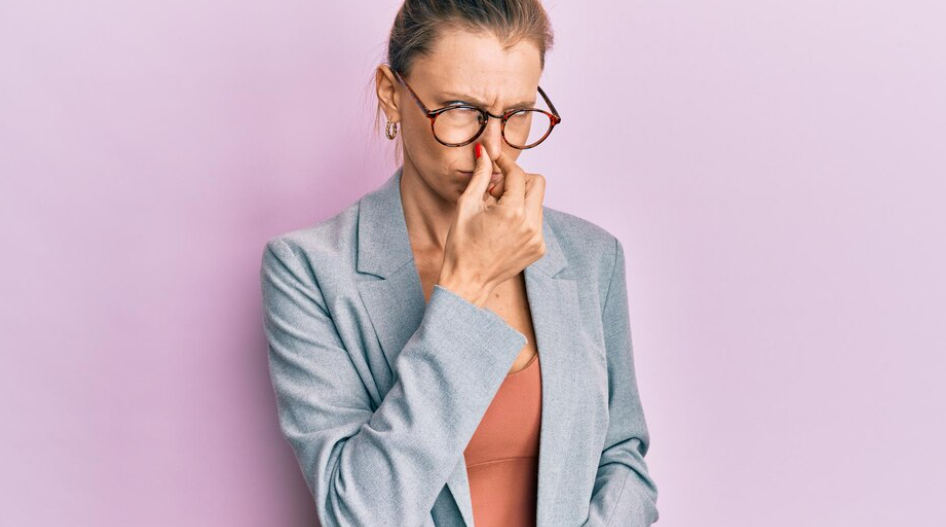Body Odor: Understanding the Unpleasant Smell

©️ Freepik
Superpowers come in all shapes and sizes. Some people have X-ray vision, others… well, they have the power to clear a room without uttering a word.
Let’s conquer body odor, the not-so-super power we can all do without!
Body odor, also known as bromhidrosis, is a common human experience. It arises from the breakdown of sweat on your skin by bacteria. Sweat itself is odorless, but certain bacteria thrive on its components, particularly proteins and fats. As these bacteria break down the sweat, they produce by-products that have a distinct and often unpleasant smell.

The Culprits Behind Body Odor
- Sweat Glands: Our bodies have two main types of sweat glands: eccrine and apocrine. Eccrine glands, found all over your body, are responsible for regulating body temperature. They produce a watery sweat that cools you down as it evaporates. Apocrine glands, located in areas like armpits and groin, become active during puberty. They produce a thicker, richer sweat that contains proteins and fats, ideal for bacterial growth.
- Bacteria on Your Skin: Everyone has bacteria on their skin, and the type and amount can significantly impact body odor. Certain bacteria strains are more adept at breaking down sweat components, leading to stronger odors. Factors like hygiene, hormones, and even diet can influence the bacterial population on your skin.
- Diet: What you eat can play a surprising role in body odor. Strong-smelling foods like garlic, onions, and spicy dishes can be absorbed by your body and released through sweat, influencing its overall odor.
- Hormones: Fluctuations in hormone levels can affect sweating and body odor. Puberty, pregnancy, and menopause are all times when hormonal changes can lead to increased sweating and potentially stronger body odor.
- Medical Conditions: In some cases, body odor can be a sign of an underlying medical condition. For instance, diabetes can alter sweat composition, leading to a sweeter smell. Liver or kidney problems can also cause changes in sweat that affect odor.
Combating Body Odor: Strategies for Freshness
Fortunately, there are several effective strategies to manage body odor and maintain a fresh scent:

- Hygiene is Key: Regular showering or bathing, especially after exercise or sweating, is crucial. Focus on areas prone to sweating, like armpits, groin, and feet. Exfoliating occasionally can help remove dead skin cells where bacteria can accumulate.
- Taming Sweat: Antiperspirants work by blocking sweat glands, reducing the amount of sweat produced. Deodorants, on the other hand, mask it with fragrance but don’t necessarily prevent sweating. Choose the product that best suits your needs.
- Clothing Choices: Opt for loose-fitting, breathable clothing made from natural fibers like cotton. Tight-fitting clothes trap sweat against your skin, creating a breeding ground for bacteria.
- Dietary Adjustments: While not a complete solution, limiting your intake of strong-smelling foods can help reduce their influence on body odor. Consider alternatives or eat them in moderation.
- Stress Management: Stress can trigger sweating, so finding healthy ways to manage stress, like exercise or relaxation techniques, can indirectly help with body odor.
When to Seek Medical Help
If home remedies don’t effectively control your smell, it’s advisable to consult a doctor. Additionally, seek medical attention if you experience:

- Excessive sweating, even at rest
- Sudden changes in your body odor
- Body odor accompanied by other symptoms like fever, fatigue, or weight loss
A doctor can help identify any underlying medical conditions and recommend appropriate treatment options, which may include stronger antiperspirants, prescription medications, or even procedures to reduce sweat gland activity.

Remember: Body odor is a normal human experience. However, excessive sweating or a strong odor that disrupts your daily life can be addressed. By understanding the causes and implementing effective strategies, you can manage it and maintain a sense of confidence.
You might also like to read: The Truth About Natural Deodorants: Are They Better for You?


